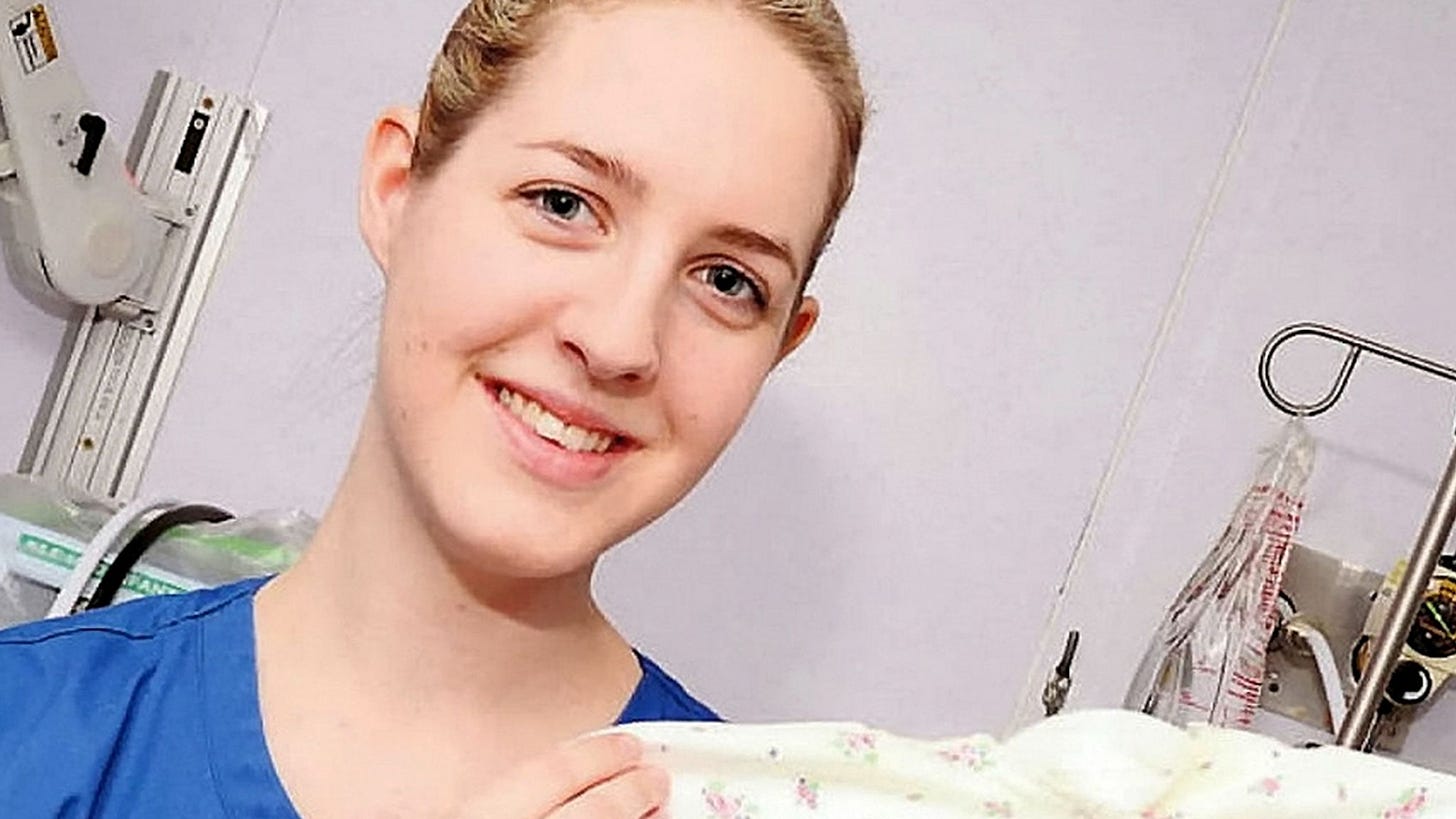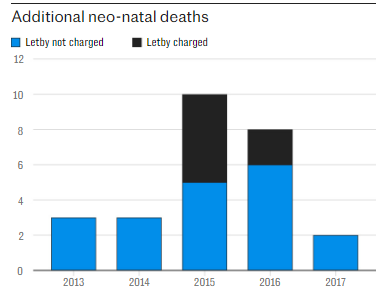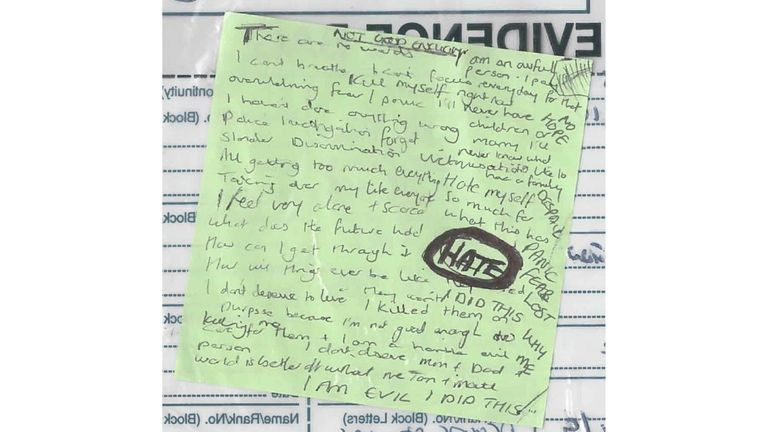Lucy Letby - Child Killer or Scapegoat of the System?
Reporting restrictions have been lifted
Lucy Letby has now been convicted of murdering seven babies and attempting to kill seven more. She was first convicted in August 2023 before her final conviction this month after a three week retrial.
This is obviously an extremely emotive case with the convictions meaning that the young, former neonatal nurse is the worst child killer in modern British history. However, she has always maintained her innocence, nobody ever saw her killing or harming a baby and all the evidence that she was convicted on is either circumstantial of statistical.
I may be completely wrong (and of course this is just my opinion as I was not in court and have not had access to all the documents and evidence provided) but this feels a lot like The System vs The System and finding a scapegoat human, so as not to find The System guilty.
Because of the recent retrial, there have been reporting restrictions in place over the last ten months. However, these only applied to the UK and in May the New Yorker investigated the serious questions about the evidence that was ignored. The online version of this investigation was blocked for UK IP addresses but archived versions and hardcopy versions could be read.
Since the retrial has concluded both the Guardian and Telegraph have reported on the inconsistencies in the case. If you are interested in the trial, I recommend you read all three articles (or at least one of them) because they go into a lot of detail that I won’t do here. Instead, if you want a quick summary of the three articles, then keep reading:
One of the main pieces of evidence was a chart showing that Letby was present during all the suspicious incidents. Many experts have been saying all along that this was “cherry-picked” data. For example, there was an increase in neo-natal deaths even if you remove the ones that Letby was charged with (see chart below). It’s my understanding that the jury were not told about these additional deaths, instead they were given a chart showing that Letby was present at all the deaths that had been selected for the trial.
Dr. Alexander Coward demonstrated that similar charts could be created for any nurse by selectively highlighting shifts where incidents occurred.
People get the wrong end of the stick with statistics. In my opinion there was nothing out of the ordinary statistically in the spike in deaths, and all the shift chart shows is that when Letby was on duty, Letby was on duty.” John O’Quigley, professor of statistical science at University College London
Furthermore, once the deaths were being investigated in 2017, Letby was taken off duty. The graph below shows that neo-natal deaths dropped at that point, suggesting that Letby was guilty. However, the hospital itself had also been downgraded at that point and so the sickest babies were being transferred to another hospital.
Law professor Burkhard Schafer questioned the prosecution’s use of statistics, claiming they had made errors, omissions in the data, limited sample sizes and had unclear criteria as to which incidents qualified as suspicious.
It suggests that above and beyond Letby, there was something else going on in the neonatal unit that was increasing the death risk for babies. Statistician Peter Elston
The prosecution claimed that all the babies had been in relatively good health. In reality, many were extremely premature, had low birth weights and suffered from numerous complications. Experts argue that this misrepresentation likely influenced the jury’s perception.
Michael Hall, a consultant neonatologists, was instructed as an expert for the defence but was never called. He argues that the prosecution exaggerated the babies’ health to make their sudden deteriorations appear more suspicious.
Letby was accused of killing the babies in two ways - by injecting them with air and by poisoning them with insulin. Speculative evidence that the babies’ veins or stomachs were injected with air was presented and relied predominantly on research by Dr. Shoo Lee. Strangely, Dr. Lee was not called by the defence in the first trial but did give expert testimony in her appeal. Lee himself said that in his view none of the evidence indicated that air had been injected. His testimony was not admissible to the court of appeal because the judges said the defence should have called him to the original trial. Other experts have also agreed that the diagnosis of air embolism was scientifically unsound.
The second method, poisoning by insulin, is also questioned. Many experts have questioned the reliability of the tests, pointing out inconsistencies and the lack of forensic testing. The tests conducted did not measure the amount of insulin in the babies’ bodies, only the antibodies that are produced as a result. Professor Joseph Wolfsdorf from Harvard Medical School said that the findings could not conclusively prove external insulin administration.
“With regard to the medical evidence, I don’t think the prosecution proved she was guilty beyond reasonable doubt. I don’t think she had a fair trial because no medical expert witness was called for the defence to challenge the prosecution expert medical evidence.” Neonatologist Dr Mike Hall
The neonatal unit at the Countess of Chester Hospital had significant issues including chronic understaffing, inadequate facilities and poor management. These systemic failures were documented in multiple reports and were argued to have contributed to the high mortality rate. A review by the Royal College of Paediatrics and Child Health (RCPCH) identified serious concerns with the neonatal unit, including insufficient senior cover, high staff turnover and inadequate training and equipment.
On top of this, the ICU had serious drainage issues with raw sewage often overflowing into the ward when it rained. Staff were therefore unable to clean their hands and generally the unit was dirty. The plumber who attended 11 incidents in one year was the only witness the defence called at the trial.
Friends, family and colleagues always described Letby as competent and caring. There seemed to be no motive and no psychological profile of a serial killer. One of the crucial pieces of evidence were handwritten notes that were found in Letby’s home. These scribblings included the words “I am evil, I did this” and “I killed them on purpose because I’m not good enough to care for them”. The prosecution said that these were confession notes but Letby denied this and as the defence pointed out, these look more like the outpouring of a young woman in fear and despair after being accused of killing babies.
It seems the prosecution’s main expert witness was a man called Dr Dewi Evans who left clinical practice in 2009. Evans contacted the police himself to offer his services and Letby’s counsel argued that he was biased, creating a story to fit the facts. Eight experts that were contacted by the Guardian described his theories as “nonsensical” or “rubbish”, “ridiculous”, “implausible” and “fantastical”.
Another oddity of the case is the lifetime anonymity ruling for the medical professionals involved as witnesses. Normal reporting restrictions would end once the trial had concluded but witnesses in this case will remain anonymous for life. The judge granted anonymity to everyone who applied for it.
Letby has now been denied permission to appeal against her convictions. Again, strangely, the reasons for the judges’ decision were not made public, nor were the full details about her appeal. She has been sentenced to life imprisonment with a whole life order - the most severe sentence possible under English law.
There have been enough miscarriages of justice in similar cases to keep on questioning Letby’s conviction. Especially when looking at all the evidence, things don’t feel quite right. Is Letby another Sally Clark, who was convicted of murdering her two infant sons on statistical evidence, before being found innocent and released in 2003?
Or the next Lucia de Berk, a Dutch nurse who was convicted for four murders and three attempted murders in 2003. Once again, statistics were used to convict de Berk until the case was reopened and she was released in 2009. In her appeal hearing, the court accepted that all the deaths she had been convicted for were entirely natural.
Dr Svilena Dimitrova, an NHS consultant neonatologist, said “there are fundamental flaws in the justice system when it comes to prosecuting healthcare professionals, which mean that it does not address systemic NHS failures and blames individuals instead … The information presented to court was flawed and not proof of guilt beyond doubt”.
Is the NHS, which many now call ‘Our NHS’, placed on such a pedestal that the justice system would prefer to find a human guilty over the nation’s sacred cow? Even Letby’s barrister said “It’s important I make it plain that in no way is this case about the NHS in general…We all feel strongly about the NHS and we are protective of it”. A major red flag, if ever I saw one.








What I find most disturbing is that a whole life sentence without parole can be imposed upon someone without a single piece of empirical evidence. We should all be outraged by a regime that can and does protect itself in this manner, it means that none of us is safe.
Thank you for the summary and for posting.
In these corrupt times, never take at face value anything from officialdom, least of all the NHS and the judicial system.